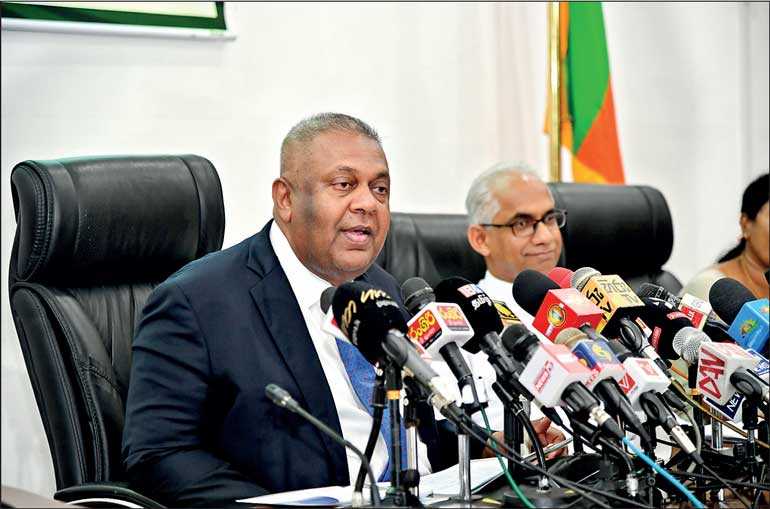Saturday Feb 21, 2026
Saturday Feb 21, 2026
Friday, 8 March 2019 00:00 - - {{hitsCtrl.values.hits}}

Strewing bouquets for Budget 2019, Finance Minister Mangala Samaraweera yesterday said it had received praise even from Opposition parties, and described it as a Budget that empowers “people who want to help themselves.”
Samaraweera described the Budget as being the first United National Party (UNP) Budget, and expressed confidence that it would lay the groundwork for the Government to return to power, to complete proposals that stretched out beyond 2019. Acknowledging that implementation needs to be improved, Samaraweera noted that he planned to hold regular press conferences, possibly as many as two each week, to discuss a specific segment of the Budget, and update the public on its execution progress.
“Even though we came to power in 2015, I regard this as the first UNP Budget. It has a mix of liberal economic policies and measures to strengthen vulnerable groups. This is a Budget that helps people to help themselves. Even the Opposition has accepted that it is a good Budget. I saw that even Namal Rajapaksa has noted this, but I disagree with him that it’s a last-minute Budget. I think we have enough time to implement it, and I’m happy with the response,” Samaraweera said.
Responding to questions, Samaraweera agreed to look into tax concessions given for Electric Vehicles, as models under 100KWs are no longer imported to Sri Lanka, and also consider how the carbon tax would be levied. However he argued that vehicles have not been priced completely out of the reach of the middle class, pointing out that small trucks such as the “Dimo Batta” would see prices drop by Rs. 100,000, and single cabs by Rs. 500,000. He also said existing LCs will be allowed to import at previous prices.
“People should not always complain about taxes. Taxes are essential for a country. In Sri Lanka, still, 82% of taxes are indirect. We only have about 246,000 tax files. For a population of 20 million, we should have at least one million income tax files. This needs to change.”
Recalling the economic issues faced during the constitutional crisis, Minister Samaraweera was nonetheless upbeat about growth prospects for 2019, and insisted that stabilisation has taken place. “There are economic challenges but there is no economic crisis,” he said, calling on political detractors of the Government to stop spreading misinformation of an economic collapse.
“Despite having to repay historically high levels of debt, we have still created space to help the masses. The public sector was given a Rs. 2500 increase from the Budget. In 2015, we increased salaries by Rs. 10,000 in one go. Over the last three years, this raise was systematically absorbed into the basic salary, which is higher than any given by a previous Government. As a result, the lowest salary of an office assistant has grown from Rs. 11, 730 in 2015 to Rs. 21,740. The lowest salary of a teacher has increased from Rs. 16,000 to Rs. 29,000. This is how well we have treated the public sector.”
Samaraweera also pointed out that the Budget had increased allowances for the armed forces, which had been overlooked for 20 years by previous Governments. He noted that these were not provided even by the Government of Opposition Leader Mahinda Rajapaksa.
The Scholarship for Educational Excellence or SEE Fund, that aims to select the top Advanced Level students and send them to Ivy League universities, is essential for growth, he argued. “We want the best and brightest of Sri Lanka to become exposed to the best and brightest in the world.” Samaraweera called on students to make use of the scholarships and loans available at concessional rates to realise their full potential.